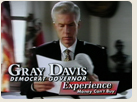
DAVIS FOR GOVERNOR CAMPAIGN, 1998
In 1998, Garry South managed the come-from-behind, landslide victory of then-Lt. Gov. Gray Davis for governor of California – the first sitting Lieutenant Governor of the state in 72 years to win the governorship in his own right, and the only Democrat ever to do so. But at one point in the campaign, Davis was running a poor fifth in the respected Field Poll, with only 8 percent of the vote. As late as March 1998, two months before the primary, he was mired in fourth place. One national magazine wrote him off as “road kill.”
Davis’s two self-funding Democratic primary opponents between them spent nearly $60 million, still a national record for a state primary campaign. But through clever marshalling of resources, perfect timing, a highly targeted approach to voters – and a devastatingly effective slogan, “Experience Money Can’t Buy” – Davis demolished the other Democrats, spending only $9 million but receiving more votes than both of them combined. The headline in the San Diego Union-Tribune said it all: “Davis defeats big money.” He even received more votes than the only Republican running in the open primary, Atty. Gen. Dan Lungren.
In the general election, Davis swamped Lungren, the Republican nominee, by 58-38 – the biggest winning margin in an open-seat governor’s race in the state in 40 years – becoming the first Democratic governor of California to be elected in 20 years, and only the fourth in the entire 20th century.
The Sacramento Bee described South as the “mastermind” behind Davis’s victories, while the non-partisan California Journal described his work as “stunning” and “one of the greatest resurrections in California political history.” For his achievement, he was named “Campaign Manager of the Year” by the American Association of Political Consultants, an honor he shares with Karl Rove, James Carville and the late Lee Atwater.